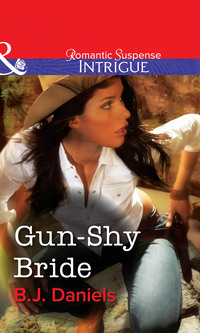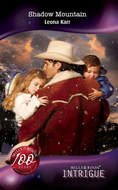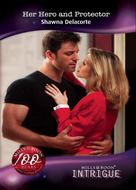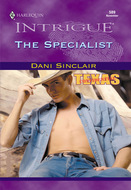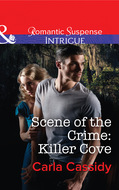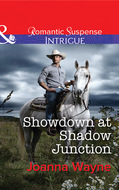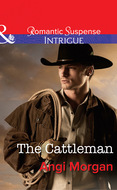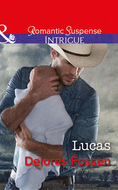Książki nie można pobrać jako pliku, ale można ją czytać w naszej aplikacji lub online na stronie.
Czytaj książkę: «Gun-Shy Bride»
Gun-Shy Bride
B. J. Daniels

MILLS & BOON
Before you start reading, why not sign up?
Thank you for downloading this Mills & Boon book. If you want to hear about exclusive discounts, special offers and competitions, sign up to our email newsletter today!
Or simply visit
Mills & Boon emails are completely free to receive and you can unsubscribe at any time via the link in any email we send you.
Table of Contents
Cover
Title Page
About the Author
Dedication
Chapter One
Chapter Two
Chapter Three
Chapter Four
Chapter Five
Chapter Six
Chapter Seven
Chapter Eight
Chapter Nine
Chapter Ten
Chapter Eleven
Chapter Twelve
Chapter Thirteen
Chapter Fourteen
Epilogue
Copyright
About The Author
BJ DANIELS wrote her first book after a career as an award-winning newspaper journalist and author of thirty-seven published short stories. Since then she has won numerous awards including a career achievement award for romantic suspense and numerous nominations and awards for best book.
Daniels lives in Montana with her husband, Parker, and two springer spaniels, Spot and Jem. When she isn’t writing, she snowboards, camps, boats and plays tennis. Daniels is a member of Mystery Writers of America, Sisters in Crime, Thriller Writers, Kiss of Death and Romance Writers of America.
TO contact her, write to: BJ Daniels, PO Box 1173, Malta, MT 59538, USA, or e-mail her at bjdaniels@mtintouch. net. Check out her webpage at www.bjdaniels.com
From the beginning my husband Parker has been there for me. He was the one who encouraged me to quit my paying job even though he knew how hard it would be for us financially. He’s always believed in me and takes up the slack so I can just write. He’s my hero. This book, which may be my all-time favorite, is for him.
Chapter One
The wind howled down the ravine as Deputy Sheriff McCall Winchester poked what appeared to be a mud clod with the toe of her cowboy boot.
The thunderstorm last night had been a gully-washer. As her boot toe dislodged some of the mud, she saw that the pile of objects in the bottom of the gully was neither mud nor rock.
“Didn’t I tell you?”
McCall looked up at the man standing a few feet away. Rocky Harrison was a local who collected, what else? Rocks.
“It’s always better after a rainstorm,” he’d told her when he’d called the sheriff’s department and caught her just about to go off duty after working the night shift.
“Washes away the dirt, leaves the larger stones on top,” Rocky had said. “I’ve found arrowheads sitting on little columns of dirt, just as pretty as you please and agates large as your fist where they’ve been unearthed by a good rainstorm.”
Only on this bright, clear, cold spring morning, Rocky had found more than he’d bargained for.
“Human, ain’t they,” Rocky said, nodding to what he’d dug out of the mud and left lying on a flat rock.
“You’ve got a good eye,” McCall said as she pulled out her camera, took a couple of shots of the bones he’d found. They lay in the mud at the bottom of the ravine where the downpour had left them.
With her camera, McCall shot the path the mud slide had taken down from the top of the high ridge. Then she started making the steep muddy climb up the ravine.
As she topped the ridge, she stopped to catch her breath. The wind was stronger up here. She pushed her cowboy hat down hard, but the wind still whipped her long dark hair as she stared at the spot where the rain had dislodged the earth at the edge. In this shallow grave was where the bones had once been buried.
Squinting at the sun, she looked to the east. A deep, rugged ravine separated this high ridge from the next. Across that ravine, she could make out a cluster of log buildings that almost resembled an old fort. The Winchester Ranch. The sprawling place sat nestled against the foothills, flanked by tall cottonwood trees and appearing like an oasis in the middle of the desert. She’d only seen the place from a distance from the time she was a child. She’d never seen it from this angle before.
“You thinking what I am?” Rocky asked, joining her on the ridge.
She doubted that.
“Somebody was buried up here,” Rocky said. “Probably a homesteader. They buried their dead in the backyard, and since there is little wood around these parts, they didn’t even mark the graves with crosses, usually just a few rocks laid on top.”
McCall had heard stories of grave sites being disturbed all over the county when a road was cut through or even a basement was dug. The land they now stood on was owned by the Bureau of Land Management, but it could have been private years ago.
Just like the Winchester land beyond the ravine which was heavily posted with orange paint and signs warning that trespassers would be prosecuted.
“There’s a bunch of outlaws that got themselves buried in these parts. Could be one of them,” Rocky said, his imagination working overtime.
This less-civilized part of Montana had been a hideout for outlaws back in the late 1890s or even early 1900s. But these remains hadn’t been in the ground that long.
She took a photograph of where the body had been buried, then found herself looking again toward the Winchester Ranch. The sun caught on one of the large windows on the second floor of the massive lodge-style structure.
“The old gal?” Rocky said, following her gaze. “She’s your grandmother, right?”
McCall thought about denying it. After all, Pepper Winchester denied her very existence. McCall had never even laid eyes on her grandmother. But then few people had in the past twenty-seven years.
“I reckon we’re related,” McCall said. “According to my mother, Trace Winchester was my father.” He’d run off before McCall was born.
Rocky had the good sense to look embarrassed. “Didn’t mean to bring up nothin’ about your father.”
Speaking of outlaws, McCall thought. She’d spent her life living down her family history. She was used to it.
“Interesting view of the ranch,” Rocky said, and reached into his pack to offer a pair of small binoculars.
Reluctantly, she took them and focused on the main house. It was much larger than she’d thought, three stories with at least two wings. The logs had darkened from the years, most of the windows on at least one of the wings boarded up.
The place looked abandoned. Or worse, deteriorating from the inside out. It gave her the creeps just thinking about her grandmother shutting herself up in there.
McCall started as she saw a dark figure appear at one of the second floor windows that hadn’t been boarded over. Her grandmother?
The image was gone in a blink.
McCall felt the chill of the April wind that swept across the rolling prairie as she quickly lowered the binoculars and handed them back to Rocky.
The day was clear, the sky blue and cloudless, but the air had a bite to it. April in this part of Montana was unpredictable. One day it could be in the seventies, the next in the thirties and snowing.
“I best get busy and box up these bones,” she said, suddenly anxious to get moving. She’d been about to go off shift when she’d gotten Rocky’s call. Unable to locate the sheriff and the deputy who worked the shift after hers, she’d had little choice but to take the call.
“If you don’t need my help …” Rocky shifted his backpack, the small shovel strapped to it clinking on the canteen he carried at his hip as he headed toward his pickup.
Overhead a hawk circled on a column of air and for moment, McCall stopped to watch it. Turning her back to the ranch in the distance, she looked south. Just the hint of spring could be seen in the open land stretching to the rugged horizon broken only by the outline of the Little Rockies.
Piles of snow still melted in the shade of the deep ravines gouged out as the land dropped to the river in what was known as the Missouri River Breaks. This part of Montana was wild, remote country that a person either loved or left.
McCall had lived her whole life here in the shadow of the Little Rockies and the darker shadow of the Winchester family.
As she started to step around the grave washed out by last night’s rainstorm, the sun caught on something stuck in the mud.
She knelt down to get a better look and saw the corner of a piece of orange plastic sticking out of the earth where the bones had been buried.
McCall started to reach for it, but stopped herself long enough to swing up the camera and take two photographs, one a close-up, one of the grave with the corner of the plastic visible.
Using a small stick, she dug the plastic packet from the mud and, with a start, saw that it was a cover given out by stores to protect hunting and fishing licenses.
McCall glanced at Rocky’s retreating back, then carefully worked the hunting license out enough to see a name.
Trace Winchester.
Her breath caught in her throat but still she must have made a sound.
“You say somethin'?” Rocky called back. McCall shook her head, pocketing the license with her father’s name on it. “No, just finishing up here.”
Chapter Two
Inside her patrol pickup, McCall radioed the sheriff’s department. “Looks like Rocky was right about the bones being human,” she told the sheriff when he came on the line.
“Bring them in and we’ll send them over to Missoula to the crime lab. Since you’re supposed to be off shift, it can wait till tomorrow if you want. Don’t worry about it.”
Sheriff Grant Sheridan sounded distracted, but then he had been that way for some time now.
McCall wondered idly what was going on with him. Grant, who was a contemporary of her mother’s, had taken over the job as sheriff in Whitehorse County after the former sheriff, Carter Jackson, resigned to ranch with his wife Eve Bailey Jackson.
McCall felt the muddy plastic in her jacket pocket. “Sheriff, I—” But she realized he’d already disconnected. She cursed herself for not just telling him up front about the hunting license.
What was she doing?
Withholding evidence.
She waited until Rocky left before she got the small and her other supplies from behind her seat and walked back over to the grave. The wind howled around her like a live animal as she dug in the mud that had once been what she now believed was her father’s grave, taking photographs of each discovery and bagging the evidence.
She found a scrap of denim fabric attached to metal buttons, a few snaps like those from a Western shirt and a piece of leather that had once been a belt.
Her heart leaped as she overturned something in the mud that caught in the sunlight. Reaching down, she picked it up and cleaned off the mud. A belt buckle.
Not just any belt buckle she saw as she rubbed her fingers over the cold surface to expose the letters. WIN CHESTER.
The commemorative belt buckle was like a million others. It proved nothing.
Except that when McCall closed her eyes, she saw her father in the only photograph she had of him. He stood next to his 1983 brand-new black Chevy pickup, his Stetson shoved back to expose his handsome face, one thumb hooked in a pocket of his jeans, the other holding his rifle, the one her mother said had belonged to his grandfather. In the photo, the sun glinted off his commemorative Winchester rifle belt buckle.
She opened her eyes and, picking up the shovel, began to dig again, but found nothing more. No wallet. No keys. No boots.
The larger missing item was his pickup, the one in the photograph. The one he allegedly left town in. Had he been up here hunting? She could only assume so, since according to her mother, the last time she saw was the morning of opening day of antelope season—and his twentieth birthday.
Along with the hunting license, she’d found an unused antelope tag.
But if he’d been hunting, then where was his rifle, the one her mother said he had taken the last time she saw him?
McCall knew none of this proved absolutely that the bones were her father’s. No, that would require DNA results from the state crime lab, which would take weeks if not months.
She stared at the grave. If she was right, her father hadn’t left town. He’d been buried on the edge of this ridge for the past twenty-seven years.
The question was who had buried him here?
Someone who’d covered up Trace Winchester’s death and let them all believe he’d left town.
Her hands were shaking as she boxed up the bones and other evidence—all except the license still in her coat pocket—and hiked back to her rig. Once behind the wheel, she pulled out the plastic case and eased out the license and antelope tag.
The words were surprisingly clear after almost thirty years of being buried in the mud since the plastic had protected the practically indestructible paper.
Name: Trace Winchester. Age: 19. Eyes: dark brown. Hair: Black. Height: 6 ft 3 inches. Weight: 185.
He’d listed his address as the Winchester Ranch, which meant when he’d bought this license he hadn’t eloped with her mother yet or moved into the trailer on the edge of Whitehorse.
There was little information on the license, but McCall had even less. Not surprising, her mother, Ruby Bates Winchester, never liked talking about the husband who’d deserted her.
Most of what McCall had learned about her father had come from the rumors that circulated around the small Western town of Whitehorse. Those had portrayed Trace Winchester as handsome, arrogant and spoiled rotten. A man who’d abandoned his young wife, leaving her broke and pregnant, never to be seen again.
According to rumors, there were two possible reasons for his desertion. Trace had been caught poaching—not his first time—and was facing jail. The second was that he’d wanted to escape marriage and fatherhood since McCall was born just weeks later.
A coward and a criminal. Trace solidified his legacy when he had left behind a young, pregnant, heartbroken wife and a daughter who’d never been accepted as a Winchester.
As McCall stood on that lonely windblown ridge, for the first time she realized it was possible that everyone had been wrong about her father.
If she was right, Trace Winchester hadn’t run off and left them. He’d been buried under a pile of dirt at the top of this ridge for the past twenty-seven years—and would have still been there if it hadn’t been for a wild spring storm.
NORTH OF WHITEHORSE, Luke Crawford pulled down a narrow, muddy road through the tall, leafless cottonwoods along the Milk River. The only other tracks were from another pickup that had come down this road right after last night’s rainstorm.
The road ended at the edge of a rancher’s wheat field, the same rancher who’d called saying he’d heard gunshots just before daylight.
Luke parked next to the fresh truck tracks. Past the tall old cottonwoods, down the slow-moving river, he could make out a small cabin tucked in the trees.
Just the sight of McCall Winchester’s home stirred up all the old feelings. Luke cursed himself that he couldn’t let go, never had been able to. Now that he was back in town as the new game warden, there was no way they weren’t going to cross paths.
He could just imagine how that would sit with McCall.
Over the years, he’d followed her career with the sheriff’s department and had heard she’d bought a place on the river. He’d also heard that she seldom dated and as far as anyone knew there was no man in her life.
That shouldn’t have made him as relieved as it did.
He noticed now that her sheriff’s department pickup wasn’t parked next to the cabin. Had she worked the night shift last night or the early-morning one?
With a curse, he realized she might have heard the shots the rancher had reported or seen someone coming up the river road. He had no choice but to stop by and ask her, he told himself.
He sure as hell wasn’t going to avoid her when it appeared there was a poaching ring operating in the river bottom. This was the second call he’d gotten in two weeks.
The thought of seeing her again came with a rush of mixed emotions and did nothing to improve his morning. He could just imagine the kind of reception he’d get, given their past. But now that he was back, there would be no avoiding each other—not in a town the size of Whitehorse.
Luke swore and got out, telling himself he had more to worry about than McCall Winchester as he saw the bloody drag trail in the mud. Taking his gear, he followed it.
RUBY WINCHESTER HAD JUST finished with the lunch crowd when McCall came into the Whitehorse Diner.
McCall felt light-headed after the morning she’d had. She’d come back into town, boxed up the bones and the other evidence, along with a request to compare the DNA of the bones with that of the DNA sample she’d taken from swabbing the inside of her mouth.
Even though the sheriff had told her to wait until her shift tomorrow, she’d mailed off the package to the crime lab without telling anyone. She was now shaking inside, shocked by what she’d done. Withholding evidence was one thing. Requesting the DNA test without proper clearance was another. She was more than jeopardizing her job.
But she couldn’t wait months to know the truth. She’d bought herself some time before the report came back, and she knew exactly how she was going to use it.
“You want somethin’ to eat?” her mother asked as McCall took one of the stools at the counter. “I could get you the special. It’s tuna casserole. I’m sure there’s some left.”
McCall shook her head. “I’m good.”
Ruby leaned her hip against the counter, eyeing her daughter. “Somethin’ wrong?”
McCall glanced around the small empty café. Ruby hadn’t cleaned off all of the tables yet. The café smelled like a school cafeteria.
“I’ve been thinking about my father. You’ve never really told me much about him.”
Ruby let out a snort. “You already know about him.”
“All you’ve ever told me is that he left. What was he like?” And the real question, who would want to kill him?
“What’s brought this on?” Ruby asked irritably.
“I’m curious about him. What’s wrong with that? He was my father, right?”
Ruby narrowed her gaze. “Trace Winchester was your father, no matter what anyone says, okay? But do we have to do this now? I’m dead on my feet.”
“Mom, you’re always dead on your feet, and you’re the only one I can ask.”
Ruby sighed, then checked to make sure Leo, the cook, wasn’t watching before reaching under the counter to drag out an ashtray. She furtively lit a cigarette from the pack hidden in her pocket.
McCall watched her take a long drag, blow out smoke, then wave a hand to dissipate the smoke as she glanced back toward the kitchen again.
According to Montana law, Ruby wasn’t supposed to be smoking in the café, but then laws and rules had never been something Ruby gave a damn about.
She picked nervously at the cigarette, still stalling.
“It’s a simple enough question, Mom.”
“Don’t get on your high horse with me,” Ruby snapped.
“I want to know about my father. Why is that so tough?”
Ruby met her gaze, her eyes shiny. “Because the bastard ran out on us and because I—” Her voice broke. “I never loved anyone the way I loved Trace.”
That surprised her, since there’d been a string of woven through their lives as far back as McCall could remember.
Ruby bit her lip and looked away. “Trace broke my heart, all right? And you know damned well that his mother knows where he is. She’s been giving him money all these years, keeping him away from here, away from me and you.”
“You don’t know that,” McCall said.
“I know,” Ruby said, getting worked up as she always did when she talked about Pepper Winchester. “That old witch had a coronary when she found out Trace and I had eloped.”
More than likely Pepper Winchester had been upset when she’d heard that her nineteen-year-old son had gotten Ruby pregnant. McCall said as much.
“You’re her own flesh and blood. What kind of grandmother rejects her own granddaughter? You tell me that,” Ruby demanded.
“Was my father in any trouble other than for poaching? I’ve always heard that Game Warden Buzz Crawford was after him for something he did the day before he disappeared,” McCall said, hoping to get her mother off the subject of Pepper Winchester.
Ruby finished her cigarette, stubbing it out angrily and then cleaning the ashtray before hiding it again under the counter. “Your father didn’t leave because of that stupid poaching charge.”
“Why do you say that?”
“Trace had gotten off on all the other tickets Buzz had written him. He wasn’t afraid of Buzz Crawford. In fact …”
“In fact?”
Ruby looked away.“Everyone in town knew that Buzz was gunning for your father. But Trace said he wasn’t worried. He said he knew something about Buzz….”
“Blackmail?” McCall uttered. Something like that could get a man killed.
LUKE CRAWFORD FOLLOWED the drag trail through the thick cottonwoods. Back in here, the soft earth hadn’t dried yet. The wind groaned in the branches and weak rays of sunlight sliced down through them.
The air smelled damp from last night’s storm, the muddy ground making tracking easier, even without the bloody trail to follow.
It was chilly and dark deep in the trees and underbrush, the dampness making the April day seem colder. Patches of snow had turned to ice crystals on the shady side of fallen trees and along the north side of the riverbank.
Luke hadn’t gone far when he found the kill site. He stopped and squatted down, the familiar smell of death filling his nostrils. The gut pile was still fresh, not even glazed over yet. A fine layer of hair from the hide carpeted the ground.
Using science to help him if he found the poachers, he took a DNA sample. Poachers had been relatively safe in the past if they could get the meat wrapped and in the freezer and the carcass dumped in the woods somewhere.
Now though, if Luke found the alleged poacher, he could compare any meat found in a freezer and tell through DNA if it was the same illegally killed animal.
In the meantime, he’d be looking for a pickup with mud on it and trying to match the tire tracks to the vehicle the poachers had been driving.
Pushing himself to his feet, Luke considered who might be behind the poaching. It generally wasn’t a hungry Whitehorse family desperate enough to kill a doe out of season. In this part of Montana, ranchers donated beef to needy families, and most families preferred beef over venison.
Nor did Luke believe the shooters were teenagers out killing game for fun. They usually took potshots from across the hood of their pickups at something with antlers after a night of boozing—and left the meat to rot.
As he followed the drag trail to where the poacher had loaded the doe into the back of his truck, he studied the tire tracks, then set about making a plaster cast.
While it dried he considered the footprints in the soft mud where the poachers’ truck had been parked. Two men.
After taking photos and updating his log book, he packed up, and glancing once more toward McCall’s cabin, went to give the rancher his assessment of the situation before filing his report.
Luke knew his chances of catching the poachers were slim. Not that his Uncle Buzz would have seen it that way. Buzz Crawford had built a reputation on being the toughest game warden Montana had ever seen.
But Luke tended to write more warnings than tickets and knew he couldn’t solve every crime in the huge area he covered. He didn’t have the “kill gene,” as his uncle often told him, and that explained the problem between him and Buzz.
The problem between him and McCall Winchester, his first love—hell, the only woman he’d ever truly loved—was a whole lot more complicated.
MCCALL WAS STILL CONSIDERING the ramifications of her father possibly blackmailing the former game warden. “If Trace had something on Buzz—”
“I don’t know that for sure,” Ruby hedged. “Your father really didn’t need to blackmail anyone. His mother and the Winchester money would have gotten him out of any trouble he got into.”
Not this kind of trouble, McCall thought.
But she knew what her mother was getting at. Whitehorse was a small town and deals were made between local judges and some families. McCall also knew the legendary Buzz Crawford. He wouldn’t have taken well to blackmail.
“So if my father wasn’t worried about this poaching charge …” And apparently he hadn’t been, if he’d gone hunting the next morning on that ridge. “Then why did you think he ran off?”
Ruby waved a hand through the air. “I was pregnant and crazy with hormones, out of my mind half the time, and Trace …”
“You fought a lot,” McCall guessed after having seen how her mother’s other relationships had gone over the years. “Did you have a fight the morning before he … disappeared?”
Ruby looked away. “Why do you we have to talk about this? Trace and I were both young and hotheaded. We fought, we made up.” She shrugged. “There was no one like Trace.” She smiled as if lost for a moment in the past.
And for that moment, Ruby looked like the pregnant young woman in love that she’d been in the few photographs McCall had of her—usually in uniform, alone, at the café.
The moment passed. Ruby frowned. “No matter what you’ve heard, Trace didn’t leave because of you.”
“So did he take anything when he left—clothes, belongings?”
“Just his pickup and his rifle. He would have made a good father and husband if his mother had stayed out of it. Pepper Winchester has a fortune, but she wouldn’t give him a dime unless he got out of the marriage to me and made me say my baby was someone else’s. What kind of mother puts that kind of pressure on her son?”
McCall didn’t want her mother to take off on Pepper Winchester again. Nor was she ready to tell her mother what she’d found up on the ravine south of town without conclusive evidence.
She got to her feet. “I need to get going.”
“You sure you don’t want some tuna casserole? I could get Leo to dish you up some for later. You have to eat and it’s just going to get thrown out.”
“Naw, thanks anyway.” She hugged her mother, surprised how frail Ruby was and feeling guilty for upsetting her. “I didn’t mean to bring up bad memories.”
“All that was a long time ago. I survived it.”
“Still, I know it wasn’t easy.” McCall could imagine how hurt her mother must have been, how humiliated in front of the whole town, that her husband had left her pregnant, broke and alone. McCall knew how it was to have the whole town talking about you.
“It wasn’t so bad,” Ruby said with a smile. “Within a couple of weeks, I had you.”
McCall smiled, feeling tears burn her eyes as she left, her hand in her pocket holding tight to the hunting license—the only definite thing she had of her father’s—unless she counted his bad genes.
WORD ABOUT THE BONES FOUND south of town had traveled the speed of a wildfire through Whitehorse. McCall heard several versions of the story when she stopped for gas.
Apparently most everyone thought the bones were a good hundred years old and belonged to some outlaw or ancestor.
By the time McCall left Whitehorse, the sun and wind had dried the muddy unpaved roads to the southeast. The gumbo, as the locals called the mud, made the roads often impassible.
McCall headed south into no-man’s-land on one of the few roads into the Missouri Breaks. Yesterday she’d driven down Highway 191 south to meet Rocky. But there were no roads from the ridge where she’d stood looking across the deep gorge to the Winchester Ranch.
Getting to the isolated ranch meant taking back roads that seldom saw traffic and driving through miles and miles of empty rolling wild prairie.
Over the years McCall had thought about just showing up at her grandmother’s door. But she’d heard enough horror stories from her mother—and others in town—that she’d never gotten up the courage.
The truth was, she didn’t have the heart to drive all the way out there and have her grandmother slam the door in her face.
Today though, she told herself she was on official . Of course one call to the sheriff would blow that story and leave her in even more hot water with her boss.
But already in over her head, McCall felt she’d been left little choice. Once the report came back from the crime lab—and she gave up the hunting license—it would become a murder investigation and she would be not only pulled off the case, but also locked out of any information the department gathered because of her personal connection to the deceased.
Before that happened, she hoped to get the answers she so desperately needed about her father—and who had killed him.
She knew it would be no easy task, finding out the truth after all these years. Her mother was little help. As for the Winchesters, well, she’d never met any of them. Trace had been the youngest child of Call and Pepper Winchester.
His siblings and their children had all left the ranch after Trace disappeared and had never returned as far as McCall knew. Her grandmother had gone into seclusion.
The Winchester Ranch had always been off-limits for McCall—a place she wasn’t welcome and had no real connection with other than sharing the same last name.
Darmowy fragment się skończył.
